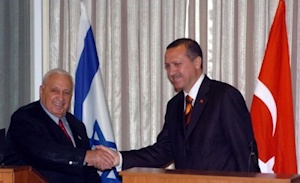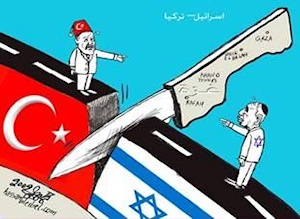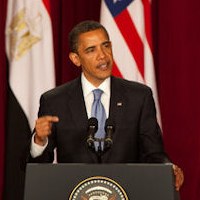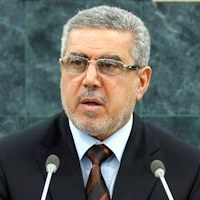![]()
Wed, Dec 19, 2012 | By Yael Miller
This article was first published in the Turkey Analyst, vol. 5 no. 24 (www.turkeyanalyst.org), a biweekly publication of the Central Asia-Caucasus Institute & Silk Road Studies Program Joint Center. © Central Asia-Caucasus Institute & Silk Road Studies Program Joint Center, 2012.
In late November, Israel conducted Operation “Pillar of Defense” against Gaza in response to ongoing rocket attacks from Hamas; the operation was condemned by several Middle Eastern powers, including Turkey. On November 21, with the help of Turkey and Egypt, Israel and Hamas negotiated a ceasefire. Later, on November 26, 2012, several newspapers reported that Israel and Turkey had resumed reconciliation talks between senior officials, marking a profound change since the low-point in relations occurred in the aftermath of the Gaza aid flotilla in 2010.
Background
Throughout the mid-1990s until the early 2000s, Turkish-Israeli diplomatic relations remained strong. Supported by the Turkish secular elite and the military, the relationship would blossom and result in free trade agreements, military exchanges, and tourism. However, the Palestinian issue would continue to gnaw at the Turkish side, with much of the Turkish electorate deeply pro-Palestinian. The AKP, however, looking to become a regional power and to promote the “no problems with neighbors” policy, would find itself increasingly looking to gain the friendship of neighbors, including Syria. These neighbors were deeply opposed to the Turkish-Israeli alliance, and therefore the relationship with Israel suffered greatly.
However, by late 2012, the AKP’s foreign policy had essentially collapsed. Both Syria and Iran, whose friendship was previously the epitome of the new pivot in Turkey’s foreign policy, have become adversaries once again to the Turkish state. Because of the reemergence of tensions, a good relationship with the United States has become more important to Turkey. The United States, unlike regional neighbors, views Israel as an important ally; because the Turkish government is still determined to maintain close ties with the United States (See Turkey Analyst, November 21, 2012 issue), therefore, some form of reconciliation with the Jewish state may be essential for renewing and strengthening ties with the United States.
On the domestic front, there is a considerable foreign policy divergence between the AKP and the followers of the influential preacher Fethullah Gülen — including on the subject of relations in Israel. Indeed, one of Gülen’s first open statements of disagreement with the AKP government was a rare interview with the Wall Street Journal following the Gaza flotilla incident in 2010.(See Turkey Analyst, June 7, 2010 issue) Gülen in fact expressed opinions directly opposing Erdoğan’s, and the growing divergence between Erdoğan and Gülen may undermine some of the public support for the Prime Minister’s harsh anti-Israeli policies.
Recently, in the wake of these negotiations after the Israeli strikes against Gaza in Operation Pillar of Defense, several Israeli news sources have reported that Israel and Turkey have resumed reconciliation talks. While at first Turkish sources denied the talks, on November 26, Turkish Foreign Minister Ahmet Davutoğlu confirmed that talks between an envoy of Benjamin Netanyahu and a senior Turkish Foreign Ministry official.
Implications
In recent years, the Israel-Turkey relationship soured significantly. Israeli-Turkish defense contracts have been frozen, and military cooperation has essentially ceased, although the economic relationship has remained relatively strong. The Turkish electorate views Israel as an aggressor and has been adamant about the necessity of an Israeli apology for the deaths of nine people on the Mavi Marmara in 2010.
Defense ties have suffered most. The hallmark of Israeli-Turkish relations, the military cooperation in which Turkish and Israeli officials swapped training and airspace, has come to a complete halt. The Turkish military has suffered technologically, unable to utilize the frozen defense contracts with Israeli military industries. The morale of the military domestically has also suffered. Given the Sledgehammer trials in which prominent military officials and generals were jailed for having allegedly planned to overthrow the Turkish government, the military is less likely than ever to support Erdoğan. (See Turkey Analyst, September 26, 2012 issue). While the military never supported the AKP, given the situation in Syria and in the Southeast of Turkey, Erdoğan needs the military more than ever.
Tourism has suffered dramatically. Once a hot spot for Israelis, Turkey has lost an estimated 400,000 Israeli tourists per year, implying millions of dollars in lost revenue. Israelis in general now refuse to travel to Turkey, which it views as having betrayed Israel. Turkey has, for the first time since 1994, canceled its participation in Israel’s annual tourism fair, reflecting, perhaps, a desire to no longer market Turkish vacations to Israelis.
Economic ties have become one of the only bright spots in the relationship. To date, the trade agreements signed with Israel have remained in effect and appear not to have been affected by the political tensions. Trade between the countries has actually reached all-time highs in recent years, and has increased steadily since the inception of free trade agreements in the mid-1990s. In early 2012, mutual trade totaled $1 billion, up from $770 million in the same time period in 2011. The two countries have traded primarily in automobiles, metals, and machinery. In 2011, for example, Turkey’s biggest automobile market outside Europe was Israel, and in the same year, Turkey bought 3 percent of the total Israeli exports, an increase of 40 percent from 2010. Economic ties have stayed strong as Turkey and Israel both benefit significantly and as they can be separated from disagreements on Israeli and Turkish military or political actions.
On the international relations front, the AKP has found itself in a new reality. Its “no problems with neighbors” strategy stands shattered, with Syria and Iran as enemies and with regional instability looming. Therefore, it is more necessary than ever for Turkey to establish good relations with the United States. The United States provides Turkey with a powerful ally as well as access to military and economic aid. This has perhaps made some form of reconciliation with Israel inevitable, and may explain the reasoning for beginning negotiations with the Israeli government.
Finally, in line with the AKP’s quest to become a regional power, it has stated repeatedly that it would be willing to broker talks between Palestinians and Israelis. The Palestinian cause is deeply important to much of the Turkish population; with Mohammed Morsi, the newly-minted leader of Egypt, taking large steps to negotiate the ceasefire between Israel and Hamas, the AKP may fear that its regional influence is slipping. Bringing the Turkish government back to the playing field by renewing ties with Israel will make the AKP seem more like an honest partner in any upcoming peace talks or negotiations.
However, the AKP is unlikely to pursue an overt rapprochement with Israel. To begin with, Prime Minister Erdoğan as well as other AKP officials have continuously denounced Israel with allegations of genocide against the Palestinians, amongst other declarations. In addition, the Turkish electorate remains staunchly pro-Palestinian, and Turkey has emerged as one of the main supporters of the Palestinian cause. The AKP’s seeming love affair with Islamists particularly in Egypt, many of whom are staunchly against ties with Israel, makes approaching Israel directly and openly a tough sell to domestic and regional audiences.
Therefore, while both parties likely see the Israeli-Turkish relationship as one that is strategically important, it is more probable that the relationship will never fully recover.
Conclusions
While senior officials are indeed in talks about the resumption of the positive Turkish-Israeli relationship, it is unlikely to hold the status it once had. First, Erdoğan enjoyed widespread popularity both within Turkey and throughout the region for his outspoken acts against Israel; Israel, on the other hand, views Turkey as a false friend. While senior officials will likely continue negotiations, it is unlikely that direct talks between Netanyahu and Erdoğan will come soon. Turkish-Israeli relations will remain cold, regardless of whether the defense contracts and relations will re-emerge.
Instead, relations may be more likely revert to the status they had prior to 1996, before the military and economic agreements emerged. Before these agreements, on the military front, Turkey and Israel engaged covertly, sharing intelligence and aiding each other surreptitiously, but not openly. Economically, ties will likely continue to stay strong, which has benefitted both countries without being too controversial. In regards to tourism, it is unlikely to recover; particularly on the Israeli side, the connotation of Turkey is now a negative one, which will likely take significant time to change.
Erdoğan must be careful not to lose the domestic support he gained from the Turkish electorate by condemning Israel, as well as appearing weak. Netanyahu, on the other hand, cannot be seen as bowing to a Muslim neighbor in the wake of an incursion into Gaza and an upcoming election year. Neither Erdoğan nor Netanyahu is likely to give up their political capital among domestic audiences for a partnership that will be viewed as a weak one of circumstance. Both of these political personalities have been famous of late for being difficult and stubborn, and it is unlikely that either will be flexible to bend to the other’s demands.
Yael Miller is a Master’s Candidate at the Johns Hopkins School of Advanced International Studies and a columnist for Ha’aretz.



 RSS
RSS













Latest Comments
Hello Mike, Thank you for your positive feedback to the article. I felt there wasn’t too much critical analysis of ...
Thanks for this considered and well constructed article. A follow up article on the manner in which the editorial contro...
THE CLUELESSNESS OF CLAIMING THAT OBAMA'S MIDDLE EAST POLICIES WERE A FAILURE CANNOT BE FURTHER FROM THE TRUTH, WHAT THE...
As long as Obama is the president of the usa do not trust the us government......
Thank you for an good read....